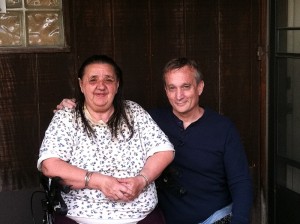
Photo © Pittsburgh Mercy Health System. Used with permission.
Twenty-three years ago, a doctor rubbed dirt in his hair and mud on his clothes. He hit the streets of Pittsburgh. His only mission was to find people who are experiencing homelessness and provide them with medical care and other services they so badly needed.
“I was surprised at the state of the homeless in my own neighborhood,” recalls Dr. Jim Withers. “It was like walking into a Third World country. There were old people, young people, and runaway kids suffering from all sorts of ailments, physical and behavioral. There were women who were victims of domestic violence and even veterans.”
Today’s health care system suffers a great deal from homelessness. A lot of money is spent on high-cost emergency treatment of these individuals since they usually seek treatment as a last resort in the advanced stages of their illnesses. Dr. Withers saw an opportunity for change. He realized that if he could reach these people where they were, he could help them do something about their conditions.
Dr. Withers’ inspiration came from his father, who was a rural doctor, and his mother, who is a retired nurse. House calls are a regular practice for rural doctors, and like his father, Dr. Withers began making these ‘house calls’ to the homeless in his city.
His mission quickly grew into a citywide program known as Operation Safety Net®. The group was established in 1992 with a Care for the Poor grant from Pittsburgh Mercy Health System (PMHS). As part of Pittsburgh Mercy and Trinity Health, serving in the tradition of the Sisters of Mercy, Operation Safety Net has since provided care to more than 10,000 individuals in the city. 1,600 of these individuals have successfully transitioned into permanent housing.
Was it difficult? “It’s easy to reach out to people who are experiencing homelessness,” says Dr. Withers. “They are actually some of the friendliest people you can meet. You just need to join them and they’ll talk freely to you.” The group works to check in on the medical status of the individuals they come across. Although they provide medical care, ensuring that the individuals get primary care, housing, and other vital human services is their goal.
Changing approach
With the growth of the group has come a change in their approach. Doctors don’t go out on the streets alone. Volunteers and staff work in groups, usually comprised of a physician, a clinical outreach specialist, and a medical student.
In addition to the street rounds, the program has added a mobile medical unit as well as a primary health care clinic, a drop-in center, a severe weather emergency shelter, housing programs, and other services. These ensure that the homeless in different parts of the city can access medical care and other essential services.
Operation Safety Net’s innovative approach and success have spread. The program has been replicated by other U.S. cities and countries on five continents with guidance from the International Street Medicine Institute. This program provides advice to various communities to start their own programs.
